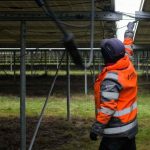The Delta variant, which first emerged in India, has caused a surge in Covid cases in Britain, throwing into doubt government plans to ease curbs from 21 June.Speaking on the sidelines of the G7 leaders’ summit in Cornwall in southwest England, Johnson said the spread was a matter of “serious, serious concern”.Reports have indicated the government is expected to announce a delay of up to four weeks to the final date for unlocking.“It’s clear that the Indian variant is more transmissible and it’s also true that the cases are going up, and that the levels of hospitalisation are going up,” Johnson told Sky News.“Now, we don’t know exactly to what extent that is going to feed through into extra mortality, but clearly it’s a matter of serious, serious concern.” Asked if he was less optimistic than he was at the end of May that restrictions could be eased as planned, a downbeat Johnson responded: “Yes, that’s certainly fair.” He added that while some data was “still open to question”, a formal announcement would come on Monday.On Friday, the government said the Delta variant was 60 per cent more transmissible in households than the variant that forced the country into its last complete lockdown in January.The research from Public Health England also showed there had been 42,323 identified cases of the Delta variant in the UK, according to data – up from 29,892 on June 2.The Alpha variant, first identified in Kent, southeast England, drove a huge surge of Covid cases in January, and hit early in Britain’s mass vaccination campaign.It caused a wave of Covid cases that stretched the state-run National Health Service (NHS) close to breaking point.Johnson said the current situation was “dramatically different from what it was in either of the first two waves of the pandemic” because of what he called the “effectiveness of the vaccine rollout”.Faced with the Delta variant, the UK has stepped up its vaccine program, and has now administered nearly 71 million jabs, with over 40 per cent of the total population fully vaccinated.It comes as Britain meanwhile hailed the G7 agreement on the “Carbis Bay Declaration” – a series of commitments to curb future pandemics after Covid-19 has wrecked economies and claimed millions of lives around the world.The collective steps include slashing the time taken to develop and license vaccines, treatments and diagnostics for any future disease to under 100 days, while reinforcing global surveillance networks.MOSCOW COVID CASES SURGE DESPITE VACCINEMoscow mayor Sergei Sobyanin on Saturday announced a “non-working” week in the Russian capital, with non-essential workers told to stay home, as Covid-19 cases hit a six-month high.The decision marks a change of tone for Russian authorities, with President Vladimir Putin repeatedly insisting that Russia has handled the pandemic better than most countries.“During the past week the situation with the spread of the coronavirus infections has sharply deteriorated,” Sobyanin said on his website as the city registered 6,701 daily infections, the highest number since December last year.Sobyanin added that “thousands” of hospital beds have been repurposed for coronavirus patients.“We cannot not react to such a situation,” he said. “To stop the growth of infections and to save people’s lives, today I signed a decree providing for non-working days between June 15-19.” The order affects all employees in the Russian capital, a city of 12 million, except for essential workers.Non-essential workers are not required to work from home during the period, but will still retain their salaries.Most Moscow workers will not return to their offices until 20 June.The mayor also announced the closure of food courts and playgrounds while restaurants, bars and clubs will be banned from serving customers between 11pm and 6am. Cases have been on the rise across the country in recent weeks as Russia struggles to inoculate its citizens despite domestic vaccines being widely available to the public.A spike in cases has also been reported in Russia’s second city Saint Petersburg, which is co-hosting the Euro 2020 football championship.Earlier this week, Sobyanin said Moscow would be opening several field hospitals to accommodate the influx of patients.Russia has been among the countries hardest hit by the pandemic, with the sixth-highest number of cases in the world, according to an AFP tally.Kremlin critics have accused authorities of downplaying the severity of the pandemic by only counting fatalities where the coronavirus was found to be the primary cause of death after autopsy.Officials have registered four homegrown vaccines – Sputnik V, its single-dose version Sputnik Light, EpiVacCorona and CoviVac.Russia’s domestic vaccination campaign started in early December, ahead of most countries, but Russians have been hesitant to sign up.Polls show that more than half of respondents do not intend to get vaccinated. So far 18 million Russians – or 12 per cent of the population – have received at least one dose of a vaccine.Putin – who the Kremlin said was vaccinated in private with one of Russia’s jabs – has repeatedly called on Russians to get immunised.UK TO EXTEND LOCKDOWN AS DELTA VARIANT SPIKES Boris Johnson is set to delay Britain’s lockdown-lifting “Freedom Day” to July 19 after cases of the Delta variant exploded by 240 per cent in just a week, according to a report in The Sun.Under plans drawn up to be announced on Monday, a two-week review will be included meaning Covid restrictions could be dropped on July 5 if hospitalisations stay down.But multiple sources reportedly told The Sun that the chances of lifting restrictions as planned on June 21 were close to zero.Under the British government’s road map, England had planned to drop rules on numbers at social gatherings and allow large weddings and the reopening of nightclubs from June 21.British government sources involved in planning for the delay, point to the fact that all UK adults will have been offered at least one jab by the end of July, with short delay considered far better than having to U-turn and reintroduce restrictions.“The last thing they need is a hokey cokey of in out, in out of restrictions,” one source told the outlet.“No one wants to go backwards, and we have to get this right first go.”The delay will be used to work out if the vaccine rollout really means rising cases numbers do not spark a surge in hospitalisations – and it will allow millions more people to be double jabbed.The British government said on Friday local time that the new Delta coronavirus variant is 60 per cent more transmissible in households than the variant that forced the UK to lock down in January.The Delta variant, which first emerged in India, has caused a rise in cases in Britain, prompting questions about whether social distancing restrictions will be lifted as planned from June 21.New research from Public Health England “suggests that the Delta variant is associated with an approximately 60 per cent increased risk of household transmission” compared to the Alpha variant first identified in southeast England.CONTAMINATION FEARS FOR MILLIONS OF JAB DOSESSouth Africa’s health minister says the African nation is struggling to cope with a third wave of the pandemic, as two lots of the Johnson & Johnson vaccine will be put on hold — that is some two million vaccines.It coomes as the US Food and Drug Administration (FDA) has told Johnson & Johnson that millions of doses of Covid vaccine produced at a troubled plant can’t be used because of possible contamination issues.In a statement, the FDA said “several” batches of vaccine manufactured at the Emergent BioSolutions facility in the city of Baltimore were not suitable for use. Each batch is known to correspond to several million doses.Neither the agency nor J & J revealed the precise number doses, US media has estimated it could be as high as 60 million.“These actions followed an extensive review of records, including the production history of the facility and the testing performed to evaluate the quality of the product,” said FDA scientist Peter Marks.The Emergent plant was ordered to pause production in April, several weeks after it was determined that batches of substance used to produce the J & J vaccine were cross-contaminated with ingredients from the AstraZeneca vaccine, ruining a reported 15 million J & J doses.The FDA is still deciding whether to allow the factory to reopen. Some 60 million AstraZeneca doses produced there and earmarked to be donated abroad are currently being inspected for quality before they can be shipped.All of the J & J vaccines distributed and used in the United States so far were made in the Netherlands, not in Baltimore.The FDA said it was greenlighting two batches of J & J vaccine made at the plant, while additional J & J batches remain under review.“Johnson & Johnson has committed to producing safe, high-quality vaccines in order to bring health and hope to people everywhere,” said J & J executive vice president Kathy Wengel.COVID-19 World Numbers
Powered by WPeMatico






